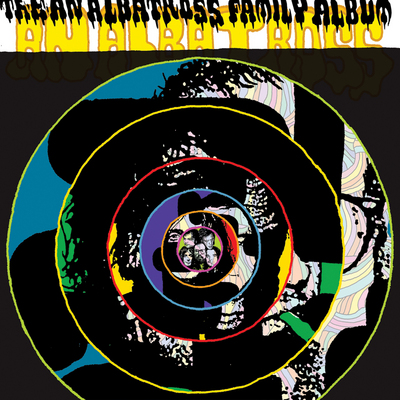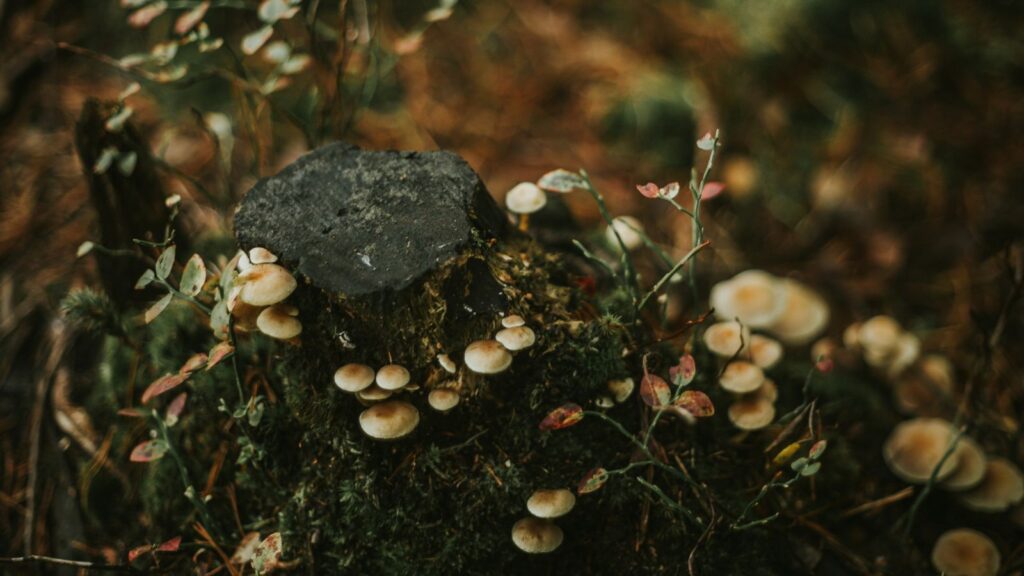Based out of Wilkes-Barre, Pennsylvania, the psychedelic grindcore punk band An Albatross has been perplexing the experimental noise rock scene for roughly a decade. In this interview I catch up with them before they embark on their latest European tour, discussing the finer points of creating lightning-fast-technical-ear-crunching mayhem, how to prepare for a live show, and the bizarre futuristic themes of their new album.
TG: The new album, called The An Albatross Family album features a large cast of musicians–nearly every musician you have played with on previous records. There is a definite spark of chaos and creative anarchy in your music. How did you harness this type of energetic chaos that your live shows are known for, and bring it into a larger group setting as a collaboration of musicians for the Family album?
AA: For this album, we went with the idea of being open and not discrediting any new ideas. Our band has gone through a lot of changes in our lives since our last album which also included a transition to a new guitarist. We approached the songs from the standpoint of complete collaboration from the core of the group as to opposed to nearly completed songs as we have done in some cases with our older recordings. We opened up the process to other former members to participate and friends to add their interpretations to form a Family vibe for the album. The album named itself in many ways.
On the Family album you spent a lot more time working on production values and the complexity of layering the arrangements. How was this process different than your previous records? You released the album on Eyeball Records, did this change have anything to do with the difference in how you made the new record?
We recorded the album in New Jersey at guitarist/engineer (Daniel Schlett) Hypersnakes studio, which enabled us complete artistic control and gave us a no stress working environment. We spent many hours to complete the album, which also included mixing and overdubs in Brooklyn, NY (Vacation Island studios) with Matt Boynton.
We wanted to finally make an album that was as close to our vision as possible. Eyeball records was generous and supportive enough to afford us the time we have asked for to make the album that is closer to what we have heard it in our heads prior to laying down the tracks. In the past, we were most always rushed, limited resources, and in sometimes awkward situations in the recording studio while trying to remain open to the creative flow. The layering, with the strings in particular, were always something that I have heard in our music, but have never had the means to bring forth. Ed Klinger (“Blessphemy” Album drummer), contributed with the arrangements. If logistically possible, we would perform with a full orchestra if we were lucky enough to play stages that matches our ambition. In the studio, we were able to open the doors wide and work to create a new painting with a whole new palate of colors. A recording and a live performance are two different mediums. Beyond all of this, this is a transitional album into the new being of An Albatross. The next album will be even more forward thinking and progressive.
Your songs are relatively technical, with abrupt time changes and weird breakdowns. It’s fast and crazy and the energy gets pretty intense. At what levels is your music a free-for-all, and at what levels is it carefully thought out? How do you approach the improvisational aspects of playing live?
Almost all of our music is completely thought out and organized. There are some sections live where there is room for improvisation though. The technique is to dance around the music, while having its form in mind. In a live setting, the music is more living and is naturally more organic. Although it’s technical music, its not without mood which can be presented in various ways. To play in this group, your mind needs to have almost a psychic quality to react to what is next while being in the moment of the measures. It’s very structured music. For a listener, its a lot all at once, but the more you listen–the more you can hear.
Your music has roots not only in the hardcore, experimental noise rock, and screamo scenes, but also with the psychedelic rock bands of the 60’s and 70’s. Some of the song titles and album artwork is suggestive of psychedelic themes. How have psychedelic experiences affected your musical tastes?
I believe that music in general is psychedelic in nature. It’s multi sensory. I think a goal is to make very high music that reaches beyond the audible realm and into a vibrational realm. Music inherently already does this. From early man banging sticks on a rock to present day shamans in the Amazon singing their Icaros. Psychedelics can attune to higher experiences of sound and vibration. They can act as a opening to new interpretations of the way one creates, feels and listens to music. These states are possible through any natural form as well, be it mediation or yoga. I would like our music to open your mind to the basic idea of possibility and how you can apply it practically to your time on this planet.
The Family album, which you seem hesitant to call a “concept album” per se, does nonetheless have some kind of story and thematic aspects. One of the more bizarre and sublime moments where this becomes apparent is in the breakdown halfway through the third track “The Hymn of the Angel People,” which feels kind of like someone in a post-apocalyptic sci-fi story tripping acid and reading from the Book of Revelations. I am reminded vaguely of some of the things that have been said about the changes that are supposedly coming in 2012. I understand that this is an allegorical story, broadly speaking. Who are these wandering pilgrims, and what are they searching for amidst the “cultural sahara” and burning cities described in the song?
The theme of the album as a whole is most audibly cinematic is the narrative in “The Hymn of The Angel People.” The other songs are loosely based on the song in which the metaphorical story alludes to a group of pilgrims in the desert who had a vision of a deity who showed them the blueprints for world harmony and love which extends over language, borders, identity and governments. They begin a journey and are searching 3,000 light years into the future where they find this deity again who provides them blueprints to return to earth to save the planet. Edward, our singer had written all of the lyrics and theme for the album.
To me, It’s most assuredly about a romanticized utopian vision of love that transforms a shift in a global collective consciousness. In these times, a musician should be acutely aware of the energy and message of what they are projecting. I have no desire to be a part of something that adds to the anger, mentality and ruthlessness of the war machine. Within the metaphors throughout the lyrics, there are some ideas that you can to apply to 2012, or maybe more immediately to the change that is happening on a global basis which has been pronounced over the past 8 years.
Over the years, after playing hundreds of shows, what do you enjoy most about performing live? How has your live show and your sense of performance as a band changed in that time?
Its always important to be forward and progressive when approaching performance. Reviewing the hundreds of shows we have played, shows to me a natural progression as age sets in after nine years as a band. Early on, we started by playing eight-minute shows–abrasive performance art. We would show up to shows and wear gas masks and make no communication with the audiences only through hand signals. As time went on and members changed, so did the way we perform. I think we have matured musically over time and are evolving our inner voice as a group. What is most the same is the full on experience that we can put forward and have an amazing time in doing so. The explosive energy is what should transcend. The listener and the participant are the ones to decide whether or not the vibrations of the music are in alignment with the way they conduct their lives.
You leave soon for the European leg of your tour for the Family album. You’ve toured over there a few times, right? Are there any places that you’re particularly looking forward to playing at?
Actually, this will be our 8th time as a band touring in Europe. Every time we travel overseas, we are learning something wonderful about the power of music and its relationship to everyone’s individual lives. Speaking with people who are explaining to you in terms from an art-cultural minded basis as to what your music reminds them of, is interesting as to opposed to playing in the U.S. where some will say “Oh your band sounds like so and so.” It’s pretty refreshing to hear different perspectives. We’re excited to play in Prague and Vienna again. It will be interesting being overseas for the most important presidential election of our lives. If McCain wins it may prove to be a tour where we will have to try our best to explain to people just what our country was thinking in their vote. It may be difficult to come home and leave our friends there.
How do you prepare to play a live show on tour? Are there any rituals you do or habits you have when getting ready for a show?
The band members prepare for a show in different ways, some include drinking, yoga, some include no ritual at all. I try to keep reserved and focused to the energy in the room. You can usually tell what the show will be and sometimes it may take more to get the excitement up and flowing. It’s not always easy. The relationship between the artist and audience are co-dependent on one another for energy exchange.
Do you have any stories or particularly memorable moments from your last tour that you’d like to share?
We just completed a three-week tour of touring the nation’s rustbelt: Ohio, Michigan, Indiana, Pennsylvania, etc. I can say that the people in the these areas are going through hard economic times, which reflected in attendance at some of our shows and also for many touring bands out on the circuit right now. You can get a sense that its not all the corporate media feeding fear to the masses. The climate of the country is changing and people are upset. We have come across angry and insulting people who have had enough of the way things are. We played a show in Indianapolis and a fight broke out. The person who was kicked out after spitting in a girl’s face in her own home, maintained that he was coming back with 30 of his friends and his shotgun to kill everyone. I saw a man in a restaurant in Illinois start screaming and causing a real scene about how he is 68 years old and worked his whole life to get what he wanted. He was very angry and threatening to sue the place and call the police because of his pepperoni on his sandwich. I just learned today that there were 430 homicides in Chicago this year. What does this say?
This mentality is part of an obvious bigger and unconscious picture of what is really happening in America. In some senses, artists and musicians are future tellers–prophetic receptors and carriers. Turbulent times in a way usually produce good artistic statements and I feel one would be wise to maintain an open ear and open heart to our current climate. Who we were is not 2008. We can craft our future as if crafting a song or a sculpture, by honoring its inherent flow and moving with it while shaping its new identity with a new consciousness.
For information about tour dates and music, visit the An Albatross MySpace.
For information about similar artists, visit Eyeball Records.















